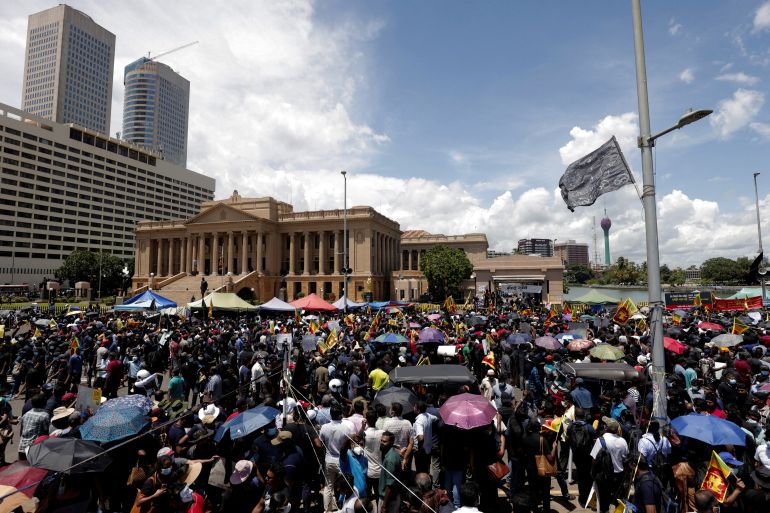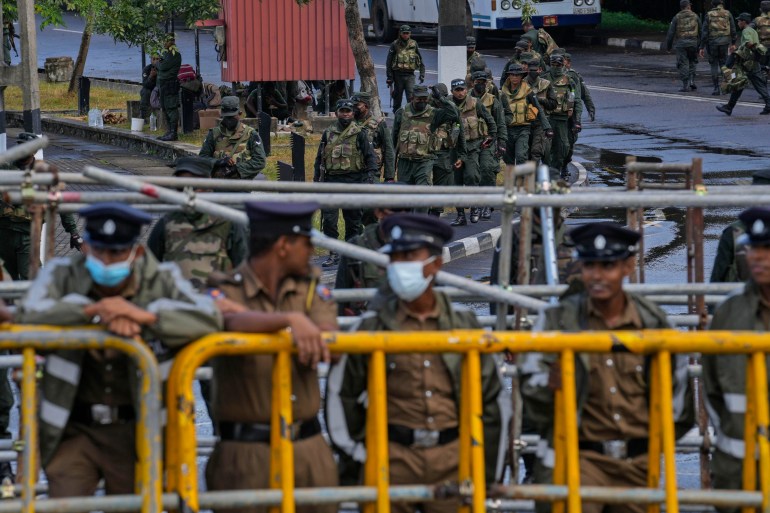‘Supreme power of people’: Sri Lanka marks 100 days of protests
The mainly youth-led movement over the island’s worst-ever economic crisis completes 100 days, with people saying the struggle is not yet over.

Colombo, Sri Lanka – A mainly youth-led mass protest movement over Sri Lanka’s worst-ever economic crisis has completed 100 days.
During the period, the protesters forced a president and a prime minister – both brothers from the powerful but now-unpopular Rajapaksa clan – to resign, with President Gotabaya Rajapaksa even fleeing the country last week to escape the uprising.
Keep reading
list of 4 itemsSri Lanka kicks off process to choose new president
‘Made people insecure’: Divisive legacy of Sri Lanka’s Rajapaksa
#GotaGoHome: The hashtag that defined Sri Lanka’s revolution
It was the first time in Sri Lanka’s history that a serving head of state had resigned.
Gotabaya’s elder brother and patriarch of the clan, Mahinda Rajapaksa, was forced to quit as prime minister in May after an attack on the main protest site in the capital Colombo by his supporters led to violence throughout the island.
A third brother, former Finance Minister Basil Rajapaksa, also resigned from his parliamentary seat and tried unsuccessfully to leave the country earlier this month.
The protesters blame the Rajapaksas, who dominated the island nation’s politics for more than two decades, for the economic crisis which saw people queueing, sometimes for days, for fuel, medicines and other essentials.
The anger came to a boil earlier this month when tens of thousands of people hit the streets in Colombo, occupying important government buildings, including the official residences of the president and the prime minister.
Meanwhile, Prime Minister Ranil Wickremesinghe, who had replaced Mahinda Rajapaksa, was declared acting president, tasked with the formation of a new government.
Anger against Wickremesinghe
While there were celebrations on Sunday at GotaGoGama – the sea-facing protest camp in Colombo – to mark the 100 days of protest, some people said they were aware their journey is not over yet.
In a controversial move late on Sunday, Wickremesinghe once again declared a state of emergency in the country in a bid to prevent protests during a parliamentary vote later this week to elect a new president.
Rev Father Jeewantha Peiris, one of the protest leaders, said the sudden declaration of the state of emergency is aimed at intimidating the protesters.
“We have been protesting peacefully for 100 days but there was no state of emergency. Then why now?” he told Al Jazeera on Monday.
“We see that Ranil Wickremesinghe is getting ready for oppression but our struggle would not be oppressed by these actions. We have a democratic right to protest and we will continue our struggle till we achieve our last demand.”

Protesters say out of their six key demands in an Action Plan declared on July 5, only one has been achieved yet.
They are not happy about the prospect of Wickremesinghe being elected by the Parliament to serve the rest of Gotabaya Rajapaksa’s term.
Wasantha Mudalige, convener of the Inter-University Student Union, has announced a demonstration on Tuesday to demand the immediate resignation of Wickremesinghe.
We have been protesting peacefully for 100 days but there was no state of emergency. Then why now?
Many trade unions have also warned of a countrywide industrial strike if Wickremesinghe takes over as full-time president.
Melani Gunathilake, another leader of the protest movement, says the protesters managed to achieve remarkable victories which earlier generations might never have imagined.
“But what Ranil Wickremesinghe did by accepting the prime minister’s post was more of a betrayal of ‘aragalaya’ than a political ploy,” she told Al Jazeera.
“We need somebody who can find solutions to our burning issues, not someone who was rejected by the people.”

Gunathilake said Sri Lanka needs a new leader “at least below the age of 60”, who is not accused of corruption and other misdeeds.
“I am glad that Gotabaya Rajapaksa is gone but we can’t enjoy or celebrate it as long as Ranil Wickremesinghe is in power.”
‘Genuine freedom struggle’
Protest leader Peiris said the protests so far have been a “victory of the people”.
“The supreme power of people has overcome the power of an oppressive regime,” he told Al Jazeera.
The Catholic clergy has played a remarkable role in “Aragalaya”, the Sinhalese word for struggle, sometimes physically stepping up to protect the protesters whenever they were attacked by the security forces.
“We see this as the genuine freedom struggle of Sri Lanka because for the first time in post-independent Sri Lanka, every segment of the society – all the people – were united.”
United they were. Every time the protesters were arrested or faced legal threats, dozens of lawyers voluntarily appeared for them and even created human shields between the forces and the protesters during tense situations.

Medical professionals and trade unions representing many other professions have been marching or helping in whichever way possible.
“When we said ‘GotaGoHome’, it wasn’t just an individual but we wanted to remove the whole corrupt system he represents. Now that he is gone, we no longer want to worship personalities,” Peiris told Al Jazeera, referring to the main slogan of the protesters.
Women rights campaigner and environmentalist Caryll Tozer, who had been protesting for weeks before the GotaGoGoma occupation began, insists that peaceful protests are the only way forward to force people’s representatives to listen to the people.
We need somebody who can find solutions to our burning issues, not someone who was rejected by the people.
“Most of the people sacrificed a lot and the aragalaya has achieved a lot. People in the world are also looking at Sri Lanka as an example of people’s power and peaceful protests,” Tozer told Al Jazeera.
She says it is disappointing, though, that people’s representatives are yet to understand the reality.
“While people have been suffering, the leaders have failed to do anything to ease that pain. People want their MPs to be their voice in the parliament, but sadly that is not happening. Politicians are using people’s suffering for their own advantage.”
Therefore, she said, the protesters would not give up until all their demands are met.
Key demands of July 5 Action Plan:
• Gotabaya Rajapaksha should immediately resign as president
• PM Ranil Wickremesinghe and his government should also quit immediately
• An interim government should be established for a maximum period of one year
• A new constitution that endorses people’s sovereignty be established through a referendum, hopefully within a year
• President’s executive powers should be reduced and democratic institutions strengthened until the new constitution is drafted
• The fundamental objective of the interim government should be to implement the above proposals
While journalist Ranhiru Subhawickrama, also a protester, is critical of the conduct of certain groups in the protest movement, he, like most Sri Lankans, is happy about its achievements.
“Those in power tried many different ways to disrupt the protest movement and create divisions. We knew from the beginning, for example, that there was a strong presence of the United National Party [UNP] within the protest movement,” Subhawikrama told Al Jazeera, referring to acting President Wickremesinghe’s party.
But when Wickremesinghe was appointed as the prime minister following Mahinda’s resignation, UNP supporters who funded the protests withdrew, he added.
‘Red signal to Rajapaksa family’
Insisting that the whole Sri Lankan society supported the youth-led Aragalaya, Subhawickrama says the need of the hour is to force political reforms.
Together with a group of protesters, he plans to form a new political party to contest the next general elections.
Chandana Wijekoon, political analyst and assistant editor of state-run Dinamina newspaper, told Al Jazeera the biggest achievement of the 100-day protests was that “we managed to give a red signal to Rajapaksa family’s authoritarian power and to any authoritarian politician”.
“Sri Lanka’s power structure has been built around certain families and everything is being handled in the country by those families. The protesters flashed a red light to that hegemonic system, asking for a more democratic way of governance,” he said.
“It [protests] was led by a new generation. They showed the rulers that a country needs to be governed in a democratic manner and not according to the wishes of several families.”
However, Wijekoon doubts the protesters have a vision for the future beyond demonstrating on the streets.
“The protesters don’t have solutions to the country’s social, economic and political issues,” he said. “I think the best thing we need to do now is to form an all-party government and build the trust among the international community.”
Wijekoon even accuses certain groups within the protest movement of being “stooges of Western countries”.
“What certain left-wing groups handled by the West want is not to resolve our burning issues but to get into power. But none of these parties or protesters have any proper programme to resolve our issues.”
But priest Peiris says their programme has already been announced. “On July 5, we put forward an Action Plan so we want anybody who comes to power to abide by that plan,” he told Al Jazeera.
The protest movement is now determined to stop Wickremesinghe from becoming the next head of state.
“He is another face of the Rajapaksas. Sri Lanka has suffered a lot due to the economic crisis created by the Rajapaksas so we don’t need another Rajapaksa to ruin us,” Peiris said.
“Except him, anybody else can come but whoever becomes next president must establish a People’s Council in addition to the parliament.”